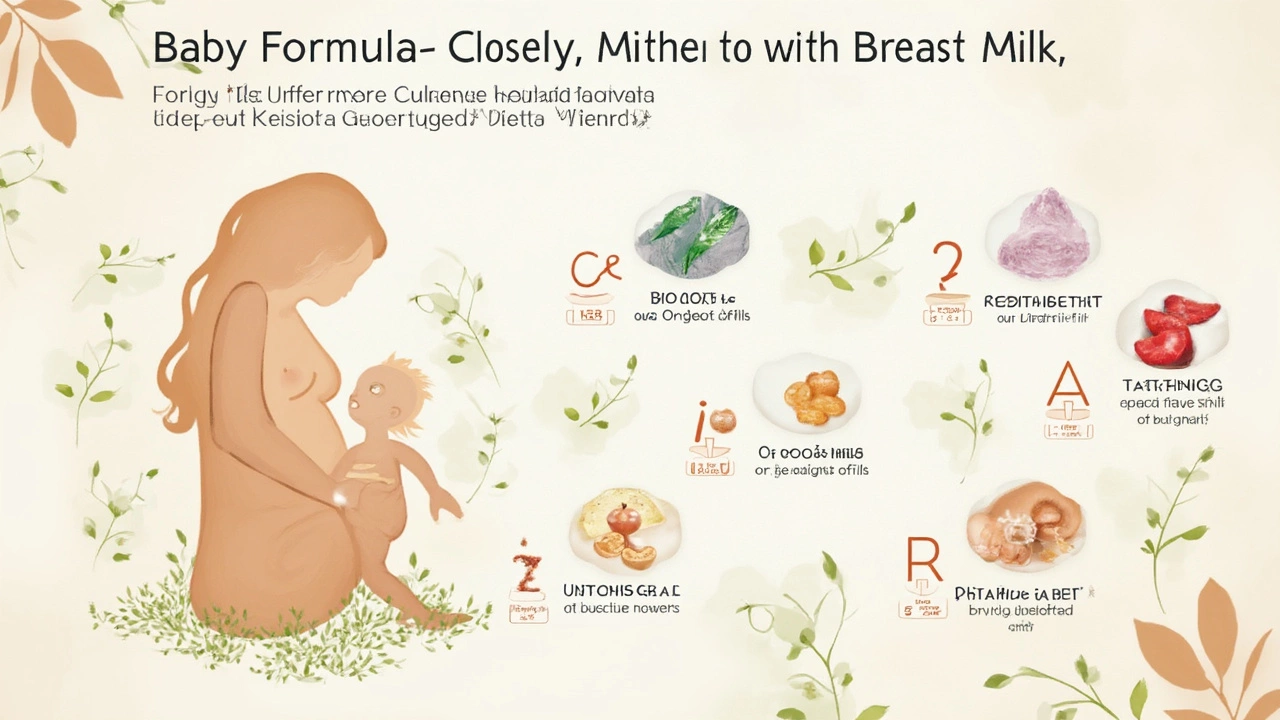
Picking the right baby formula can feel like a big deal. If you're wondering which formula gets the closest to breast milk, you're not alone. Breast milk is the gold standard when it comes to nutrition for babies, packed with just the right mix of proteins, fats, vitamins, and even antibodies. But what happens when breastfeeding isn't an option, or you need to supplement?
Most formulas try to mimic breast milk as closely as possible. They typically start with cow's milk but are modified to be gentler on a baby's tummy and fortified with the nutrients they need. You'll see lots of these include ingredients like DHA and ARA, types of omega fatty acids that are also found in breast milk and thought to be key for brain and eye development.
So, what's top of the list when it comes to formulas? Options like Enfamil Enspire and Similac 360 Total Care often get a mention because they've gone the extra mile to mirror breast milk components. But remember, every baby is different and what works for one might not work for another.
- Understanding Breast Milk Composition
- Key Ingredients in Baby Formulas
- Top Formulas Mimicking Breast Milk
- Considerations for Special Needs
- Tips for Choosing the Right Formula
Understanding Breast Milk Composition
Breast milk is nature's perfect formula, designed to meet all the nutritional needs of a newborn. It's not just about nutrition, though; it's a dynamic, living fluid that's capable of adapting to a baby's changing needs as they grow.
Proteins
Breast milk contains two main proteins: whey and casein. Whey accounts for about 60% of the protein content, and it's easily digestible, which is crucial for a baby's delicate system. In comparison, formula usually has a higher casein ratio, which can be harder for some infants to digest.
Fats
The fat in breast milk plays a significant role in the development of the brain and nervous system. It contains vital fatty acids such as DHA and ARA, which are also added to most baby formulas now because of their importance to infant nutrition.
Carbohydrates
Lactose is the main carbohydrate in breast milk and a crucial source of energy for infants. It also helps absorb nutrients like calcium. Some babies have trouble digesting cow's milk lactose, which is why lactose-free formulas are available.
Vitamins and Minerals
Breast milk is packed with vitamins and minerals that are perfect for a growing baby. Interestingly, the levels can vary based on the mother's diet, which means a well-nourished mom can boost the quality of her milk.
Immune Boosters
One of the most amazing things about breast milk is that it's loaded with antibodies and other elements that help strengthen a baby’s immune system. This is part of why breastfeeding is promoted as ideal whenever possible.
Changing Composition
| Time Postpartum | Content Shift |
|---|---|
| First Few Days | Rich in antibodies (colostrum) |
| Two Weeks | Mature milk with balanced nutrients |
| Several Months | Adjusts to baby's dietary needs |
The composition of breast milk isn't static; it changes to keep up with what your baby requires, from the first drops of colostrum to mature milk that adapts to complement solid foods. That's why replicating it in baby formula is quite a feat.
Key Ingredients in Baby Formulas
When it comes to creating baby formula that's as close to breast milk as possible, manufacturers pack it with key nutrients. Let's break down some of the big players you'll often see on the label.
Proteins
Breast milk naturally contains a blend of proteins like whey and casein, which are easy for babies to digest. Most infant formulas use cow's milk as a base, altering it to more closely match this ratio. Some even use hydrolyzed proteins to make digestion smoother for those little tummies.
Fats
Fats are a crucial source of energy for growing babies. Long-chain polyunsaturated fatty acids like DHA and ARA, naturally found in breast milk, play a critical role in brain and vision development. Many formulas now fortify with these to give your baby a similar nutritional boost.
Carbohydrates
Lactose, the main sugar in breast milk, provides ample energy and promotes healthy gut bacteria. Formulas typically match this with dairy-based lactose or alternatives like corn syrup solids for lactose-sensitive infants.
Vitamins and Minerals
Important nutrients such as calcium, iron, and vitamin D are vital for bone growth and overall health. Formulas are fortified to ensure babies get these essentials, as breastfed babies absorb these directly from mom.
Extras
Probiotics and prebiotics often pop up on the ingredients list too. They're spotted in certain baby formulas for supporting gut health and boosting immunity, areas where breast milk naturally shines.
An interesting fact: A 2022 study in the UK found that 85% of parents felt overwhelmed by the different options available but found learning about specific ingredients helped them make more confident choices.

Top Formulas Mimicking Breast Milk
When it comes to finding the baby formula that closely resembles breast milk, a few standout names have earned trust among new parents and healthcare providers alike. Let's dive into what makes these formulas special.
Enfamil Enspire
This formula is often at the top of the list because it strives to mimic key components of breast milk. It includes lactoferrin, which is a protein also found in breast milk that's believed to support immune health. Plus, this contender packs in nutrients like choline and omega-3 DHA, both crucial for your baby's brain development. Enfamil Enspire might be a little pricier, but many parents swear by its benefits.
Similac 360 Total Care
Another brand that works hard to replicate the benefits of infant nutrition found in breast milk is Similac 360 Total Care. It boasts an exclusive blend of DHA, Lutein, and Vitamin E, all designed to nourish your little one's brain and eye development. This formula is also non-GMO and features a similar oligosaccharide profile to breast milk, aiming to support the baby's digestive health.
Earth's Best Organic Sensitivity
If you're leaning towards organic options, check out Earth's Best Organic Sensitivity. Made for babes with sensitive tummies, this formula has reduced lactose and includes essential ingredients like DHA and ARA for growth and development. It's a solid choice if you're focused on eco-friendly and organic certified products.
When choosing a formula, it's crucial to consider your baby's specific needs, whether they're a bit more sensitive or if certain nutrients are a priority. These options provide a well-rounded balance that's pretty close to the real deal.
Considerations for Special Needs
When it comes to baby formula, it's not one-size-fits-all. Some babies have specific dietary needs and finding the right match is essential for their health and comfort. Let’s break down some considerations for those with special needs.
Allergies and Intolerances
Babies who can’t tolerate regular milk formulas might need alternative options. Hypoallergenic formulas are designed for infants with cow's milk protein allergies. Products like extensively hydrolyzed formulas break down proteins into smaller parts, making them easier to digest and less likely to trigger an allergic reaction.
Lactose Sensitivity
If your baby is sensitive to lactose, look for lactose-free options. These formulas replace lactose with other carbohydrates, like corn syrup solids, to support healthy digestion without the fuss.
Preterm Babies
Preterm or low-birth-weight babies may require special formulations with higher calorie content to help them grow faster. These are typically enriched with extra vitamins, minerals, and proteins necessary for their unique needs.
Digestive Health
Struggling with colic or gas? Some formulas come equipped with probiotics and prebiotics to help maintain a healthy gut flora, which could alleviate these common issues. These ingredients mimic those found in breast milk, promoting good bacteria in the digestive system.
Vegetarian or Vegan Diets
For families following a vegetarian or vegan lifestyle, soy-based formulas offer a viable option free from animal products. Just double-check with your pediatrician to ensure it meets all nutritional needs.
Before making a switch, it’s always smart to consult with your pediatrician. They can offer insights and tailored advice to make sure the formula meets your baby’s health and dietary requirements.

Tips for Choosing the Right Formula
Choosing the ideal baby formula for your little one can feel pretty daunting with the endless options on the shelf. Here's a simple guide to help break it down.
Consider Your Baby's Needs
Every baby is different, so their needs vary. Some infants may struggle with cow's milk-based options due to lactose sensitivity or other allergies. In these cases, you might want to look for hypoallergenic or soy-based formulas. Always talk to your pediatrician if you're unsure.
A Look at Ingredients
Check for ingredients like DHA and ARA, which are beneficial for brain and eye development. If your baby has a sensitive tummy, opt for a formula with partially hydrolyzed proteins that are easier to digest.
Organic vs. Non-Organic
Some parents prefer organic varieties because they're made without the use of pesticides or genetically modified organisms (GMOs). However, non-organic formulas are still safe and regulated tightly.
Powdered, Liquid, or Ready-to-Use?
Formulas come in different forms: powdered, liquid concentrate, and ready-to-use. Powdered is the most economical, but ready-to-use is convenient for on-the-go. Think about your lifestyle and your budget when making a choice.
Budget-Friendly Choices
Baby formulas can get expensive, so it's wise to factor in cost while considering your options. Luckily, store brands can often be as nutritious as name brands but at a lower price.
| Type | Approximate Cost per Ounce |
|---|---|
| Cow's Milk-Based | $0.13 - $0.25 |
| Soy-Based | $0.14 - $0.27 |
| Hypoallergenic | $0.45 - $0.55 |
Remember to give yourself some grace. It's okay to try a couple of different types before finding the perfect infant nutrition solution. If your baby is thriving, that's what truly matters!






